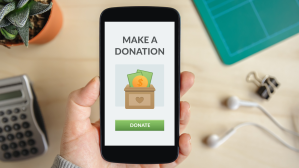 Crowdfunding platforms like GoFundMe, make it easy to contribute to worthy causes – but that ease can also open the door to scams. During times of disasters and emergency, there are spikes in fraudulent campaigns. In recent years, millions of dollars have been lost to fake charities and crowdfunding scams. These schemes prey on generosity during times of crisis, making it especially important to verify before giving. At First Financial, we believe in empowering smart giving. Here’s how to protect yourself and your finances before you click “donate.”
Crowdfunding platforms like GoFundMe, make it easy to contribute to worthy causes – but that ease can also open the door to scams. During times of disasters and emergency, there are spikes in fraudulent campaigns. In recent years, millions of dollars have been lost to fake charities and crowdfunding scams. These schemes prey on generosity during times of crisis, making it especially important to verify before giving. At First Financial, we believe in empowering smart giving. Here’s how to protect yourself and your finances before you click “donate.”
Red Flags – Spotting a Fraudulent Crowdfunding Campaign
- Vague or inconsistent campaign details: Legitimate campaigns include clear names, addresses, and purpose. Scams often feature contradicting or minimal information.
- No digital footprint: If you can’t find anything about the organizer or beneficiary online, proceed cautiously. Fake campaigns often lack verifiable details.
- Organizer’s social presence is minimal or new: Profiles with few followers or that were recently created can be red flags, so proceed with caution.
- Poor communication: Scammers will often ignore or give vague answers to your questions.
- Pressure to act immediately: Messages demanding quick donations, especially citing urgent causes – are often phishing or scam attempts.
Vet Before You Donate
- Investigate the organizer: Search their name along with words like “scam,” “complaint,” or “review.”
- Understand the cause fully: Know exactly what the funds are for and whether there’s a refund policy if the project fails.
- Ask for proof: Request evidence that the beneficiary or project exists and that funds will be used as claimed.
- Consider giving directly: Donating straight to established charities may be safer and more transparent.
- Stay local: Support causes involving people you know personally or local community efforts that you can verify.
- Check platform protections: Many platforms offer refund guarantees if fraud is confirmed, and they monitor campaigns for suspicious activity.
What to Do if You Suspect a Scam
If you suspect a scam, report it immediately to the crowdfunding platform, then warn others by using comments or social media posts to spread the word and protect your community. You should also request a refund, as many platforms do have processes in place to return your money should a campaign prove to be fraudulent.
Additionally, crowdfunding scams should be reported to the FTC and your state’s attorney general.
Safe, Thoughtful Giving
Crowdfunding campaigns can support incredible causes, but that impact only holds when the campaign is authentic. Before donating – always pause, investigate, and verify. To stay up to date on the latest scams, subscribe to our First Scoop Blog.
